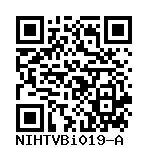HT852
NIHTVBi019-A
General
Cell Line |
|
| hPSCreg name | NIHTVBi019-A |
| Cite as: | NIHTVBi019-A (RRID:CVCL_B7SV) |
| Alternative name(s) |
HT852
|
| Cell line type | Human induced pluripotent stem cell (hiPSC) |
| Similar lines |
PUFHi004-A (TMEM163 c.227T>C p.(Leu76Pro) iPSC) Donor's gene variants: TMEM 163 Donor diseases: Leukodystrophy ZJSHi001-A (ZJSHi-KCNB1) Donor's gene variants: KCNB1 Donor diseases: developmental and epileptic encephalopathy, 26 PFIZi023-A (B217c8) Donor's gene variants: GPR56, GPR56 Donor diseases: Bilateral Frontoparietal Polymicrogyria CBIGi002-A (2890 (GBA W378G, heterozygous), 2890, IPSC0001) Donor's gene variants: GBA, GBA, GBA Donor diseases: Parkinson Disease |
| Last update | 11th April 2022 |
| User feedback | |
Provider |
|
| Generator | National Institutes of Health-National Heart, Lung, and Blood Institute (NIHTVB) |
| Owner | National Institutes of Health-National Heart, Lung, and Blood Institute (NIHTVB) |
| Distributors | |
| Derivation country | United States |
External Databases |
|
| BioSamples | SAMEA14026991 |
| Cellosaurus | CVCL_B7SV |
| Wikidata | Q114312526 |
General Information |
|
| Publications | |
| * Is the cell line readily obtainable for third parties? |
No |
| Subclones | |
Donor Information
General Donor Information |
|
| Sex | female |
| Ethnicity | Caucasian/White |
Phenotype and Disease related information (Donor) |
|
| Diseases | A disease was diagnosed.
|
Karyotyping (Donor) |
|
| Has the donor karyotype been analysed? |
Yes
Karyotyping method:
G-Banding
|
Other Genotyping (Donor) |
|
| Is there genome-wide genotyping or functional data available? |
No
|
External Databases (Donor) |
|
| BioSamples | SAMEA14026314 |
Ethics
| Has informed consent been obtained from the donor of the embryo/tissue from which the pluripotent stem cells have been derived? | Yes |
| Was the consent voluntarily given? | Yes |
| Has the donor been informed that participation will not directly influence their personal treatment? | Yes |
| Can you provide us with a copy of the Donor Information Sheet provided to the donor? | No |
| Do you (Depositor/Provider) hold the original Donor Consent Form? | No |
| If you do not hold the Donor Consent Form, do you know who does? | Yes |
| Alternatives to consent are available? | No |
| Please indicate whether the data associated with the donated material has been pseudonymised or anonymised. | anonymised |
| Does consent explicitly allow the derivation of pluripotent stem cells? | Yes |
| Does consent prevent CELLS DERIVED FROM THE DONATED BIOSAMPLE from being made available to researchers anywhere in the world? | Yes |
| How may genetic information associated with the cell line be accessed? | Controlled Access |
| Will the donor expect to receive financial benefit, beyond reasonable expenses, in return for donating the biosample? | No |
| Has a favourable opinion been obtained from a research ethics committee, or other ethics review panel, in relation to the Research Protocol including the consent provisions? | Yes |
| Name of accrediting authority involved? | National Heart, Lung, and Blood Institute (NHLBI) |
| Approval number | Clinical Protocol number 10-H-0126. |
| For generation of the cell line, who was the supplier of any recombined DNA vectors or commercial kits used? |
hIPSC Derivation
General |
|
| Source cell type |
A sample of peripheral blood mononuclear cells.
Synonyms
|
Reprogramming method |
|
| Vector type | Non-integrating |
| Vector | Sendai virus |
| Is reprogramming vector detectable? |
No |
| Methods used |
PCR
|
| Files and images showing reprogramming vector expressed or silenced | |
Vector free reprogramming |
|
| Type of used vector free reprogramming factor(s) |
None
|
Other |
|
| Derived under xeno-free conditions |
Unknown |
| Derived under GMP? |
Unknown |
| Available as clinical grade? |
Unknown |
Culture Conditions
| Surface coating | Matrigel/Geltrex |
| Medium |
Essential 8™
|
Characterisation
Analysis of Undifferentiated Cells
| Marker | Expressed | Immunostaining | RT-PCR | Flow Cytometry | Enzymatic Assay | Expression Profiles |
| NANOG |
Yes |
|
||||
| SSEA-4 |
Yes |
|
||||
| TRA 1-60 |
Yes |
|
Score:
| Marker | Present | Absent |
| mCpG | ||
| OCT4 |
Differentiation Potency
Microbiology / Virus Screening |
|
| Mycoplasma | Negative |
Genotyping
Karyotyping (Cell Line) |
|
| Has the cell line karyotype been analysed? |
Yes
|
Other Genotyping (Cell Line) |
|


Login to share your feedback, experiences or results with the research community.